Seven low-allergen gardening tips to ease hay fever symptoms this summer
Wave goodbye to runny eyes and noses

This weekend, for many of us, will simply be enjoyed as a couple of relaxing days in the sun. However, for the 13 million people who suffer from hay fever in the UK, it could be an itchy, eye-watering, runny-nose-stimulating nightmare.
If this accurately describes most of your summer days, we have seven easy tips that can help ease the sneezing in your own garden.
Money.co.uk has worked together with gardening expert Jackie Herald to share her low-allergen gardening tips. These simple suggestions will hopefully ease some of the symptoms of hay fever. So you can relax peacefully in your garden this summer.
Low-allergen gardening tips
1. Aim to garden at midday
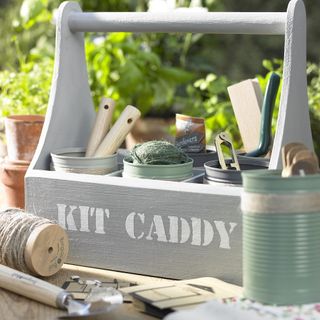
If you are a keen gardener but suffer from hay fever, aim to do all your planting and trimming around midday.
'Pollen levels are at their highest at the beginning of the day, as they rise with the warming air, and again at the end of the day when it's cooling down,' explains Jackie. She advises sticking to between 12 pm and 4 pm.
2. Keep the lawn short
'Keep the lawn short during the summer months,' advises Jackie. 'This helps to prevent the growth of lawn flowers.' It is these flowers that release grass pollen into the air, triggering hay fever.
3. Avoid planting wind-pollinated vegetable crops
Wind-pollinated crops such as sweetcorn and peas can be a nightmare for gardeners suffering from hay fever. 'Instead look to plant leafy greens and root vegetables, such as lettuce and beetroot,' suggests Jackie.
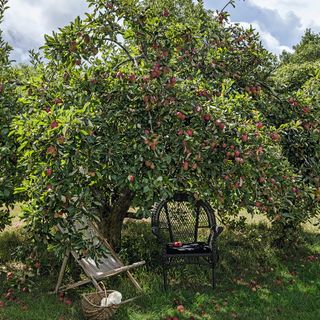
4. Plant fruit trees
Apple, cherry, rowan and juneberry trees are great to plant if you or anyone in your household suffers from hay fever. They are low-allergy and will look gorgeous all year round, offering blossom in spring, fruit in summer and amber leaves in autumn.
5. Build natural barriers with hedges
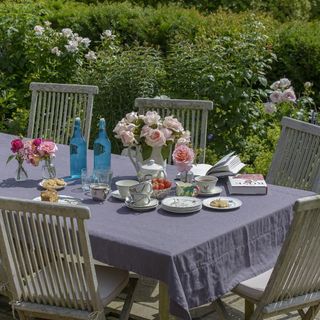
'Create natural barriers like hedges to capture and filter pollutants,' says Jackie. 'However, be wary of certain species of hedge. Yew, laurel, beech and hornbeam may all trigger hay fever.'
6. Take care when composting
Compost bins are a great way of recycling household waste. However, they can also act as a source of mould spores.
'These are even finer than pollen and hold the risk of reaching deep into the respiratory system,' explains Jackie. 'Keep the bins well away from seating areas and ensure you cover them up, as well as using gloves when handling them.'
7. Be thoughtful about your garden seating layout
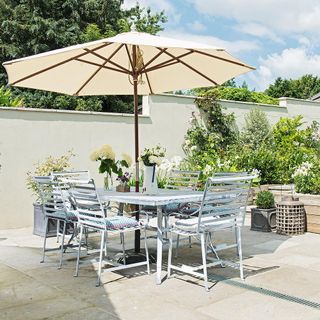
'Ensure your garden seating is well away from the more allergenic pollen sources and any potential mould spores,' says Jackie.
While it can be tempting to arrange your garden furniture under the shade of a tree, if it is alder, hazel or birch your hay fever won't thank you. Instead, position your chairs on a patio or decking with an umbrella.
Related: Expert reveals 9 simple ways to reduce allergens in the home
Will you be trying out any of these low-allergen gardening tips?
Get the Ideal Home Newsletter
Sign up to our newsletter for style and decor inspiration, house makeovers, project advice and more.

Rebecca Knight has been the Deputy Editor on the Ideal Home Website since 2022. She graduated with a Masters degree in magazine journalism from City, University of London in 2018, before starting her journalism career as a staff writer on women's weekly magazines. She fell into the world of homes and interiors after joining the Ideal Home website team in 2019 as a Digital Writer. In 2020 she moved into position of Homes News Editor working across Homes & Gardens, LivingEtc, Real Homes, Gardeningetc and Ideal Home covering everything from the latest viral cleaning hack to the next big interior trend.
-
 5 ways to organise food containers in your kitchen - for clutter-free cupboards that actually close
5 ways to organise food containers in your kitchen - for clutter-free cupboards that actually closeA ten minute task that provides so much satisfaction
By Holly Cockburn
-
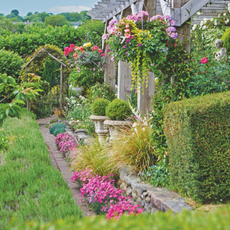 5 kitchen scraps to add to plants for brighter blooms according to florists - from coffee to pickle juice
5 kitchen scraps to add to plants for brighter blooms according to florists - from coffee to pickle juiceYour food waste is your gardens best friend
By Kezia Reynolds
-
 I tried the 90/90 decluttering rule to streamline my wardrobe – it's made me think twice about my shopping habit
I tried the 90/90 decluttering rule to streamline my wardrobe – it's made me think twice about my shopping habitIt's a quick and simple organising method with added benefits
By Jenny McFarlane